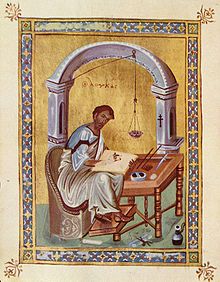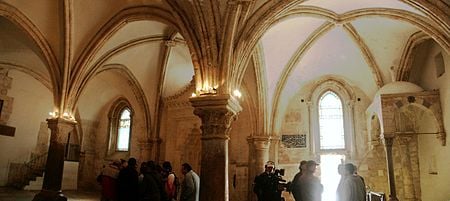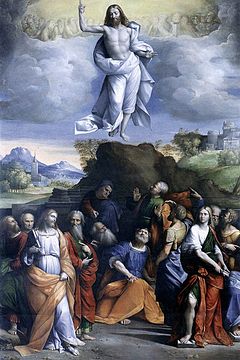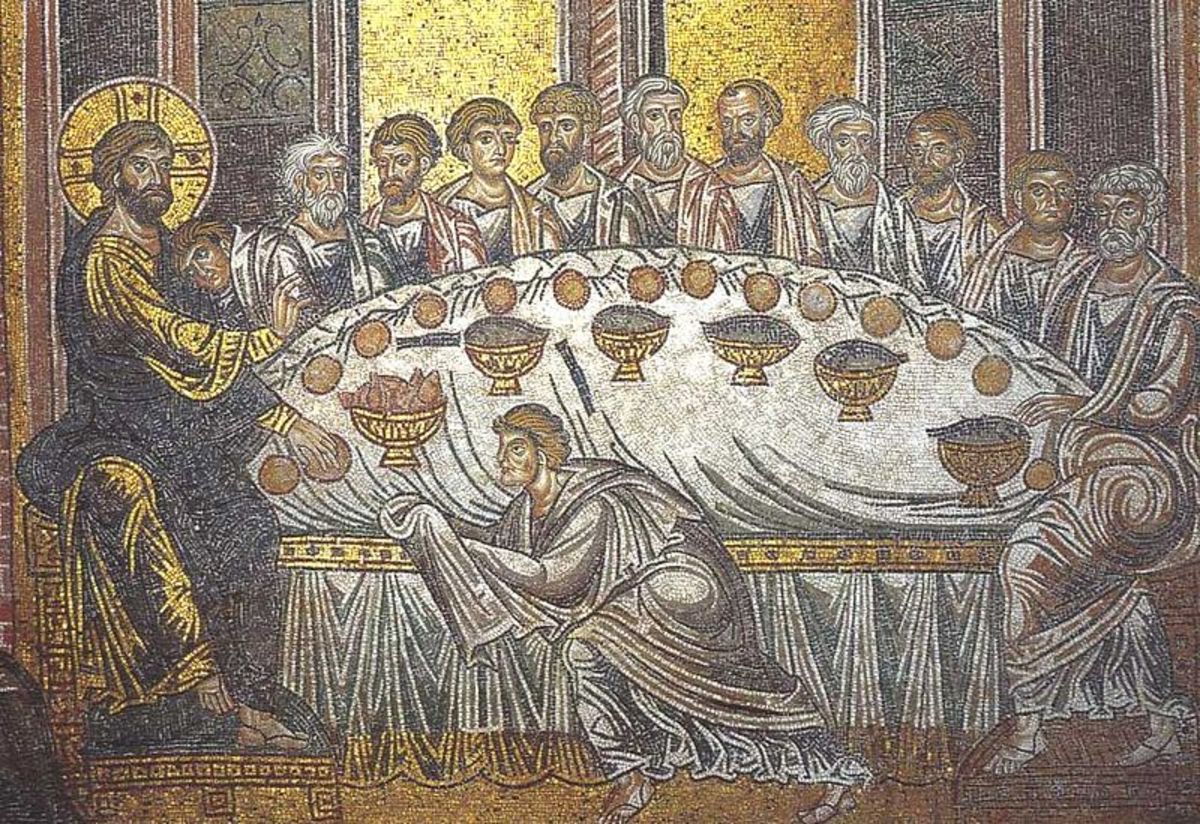Bible: What Does Acts 1 Teach Us About the Ascension of Christ and the Church?
Luke

Luke's Addressee
view quiz statisticsActs 1: "Upper Room" Instruction; The Ascension; The Church's Worldwide Commission; The Replacement of Judas
THE ACTS OF THE HOLY SPIRIT
Verses one through three provide sufficient evidence to propose Lukan authorship for this historical record of the ministries of the apostles Peter and Paul.
[Other Christian leaders (such as Stephen, Philip and Barnabas) play cameo roles, but Peter and Paul figure most prominently in Acts.]
First, the writer discloses that he had penned another, earlier account; this isolated fact, of course, does not indicate who wrote this book (v. 1a).
However, a second point—his reference to the addressee, Theophilus—points to Luke’s book, the gospel by that name, where the author also addressed the same personage (v. 1b; cf. Luke 1:3).
A third clue to authorship hints that the earlier work recorded the events describing the beginning of Christ’s ministry, leaving off with His giving of the “Great Commission” and His ascension—something that Luke did (vv. 1c-2; cf. Luke 24: 50-53).
Finally, in his gospel—the record of the beginning of Christ’s works—Luke does not mention the forty days between the Resurrection and the Ascension during which Jesus presented the apostles with “many infallible proofs,” and gave them further instruction about the kingdom of God.
Therefore, he does so here in Acts—the continuation of Christ’s ministry through His apostles (v. 3).
[Jesus appeared to hundreds of believers over that span of forty days, and allowed them to touch Him, eat with Him, and talk with Him.
Luke rightly designates these eyewitness occurrences as “infallible proofs” of Christ’s literal, bodily resurrection from the sepulcher.]
The Upper Room

Number of Days
view quiz statisticsUpper Room Instruction
Verses 4-8 record Jesus’ dialogue with His apostles shortly before His ascension in which He related valuable instruction to them about their immediate future.
Christ commands them to remain in Jerusalem until they received the “Promise of the Father”: “the baptism with the Holy Spirit” (vv. 4-5; cf. Luke 24:49).
[The first “baptism with the Holy Spirit” occurred on Pentecost: the birthday of the Church (the body of Christ); a “Spirit baptism” happens each time someone believes in Christ as Lord and Savior, joining him/her to the company of believers (see 1 Cor. 12:13).]
Since “forty days” comprised the time between the Resurrection and the Ascension, the phrase “not many days from now” (v. 5) refers to the period between the Ascension and Pentecost.
In the OT, fifty days elapsed between the Feast of the First Fruits—a type of the Resurrection (cf. 1Cor. 15:20; Lev. 23:11)—and the Feast of Weeks—a feast celebrated seven (that is, a week of) weeks after First Fruits (see Lev. 23:15-16).
Therefore, the designation “not many days” adds up to ten.
The assembled apostles ask Jesus if He intended to “restore the kingdom to Israel” at that time (v. 6).
Considering their question as legitimate—after all, the King was in their midst—Christ nevertheless responds to them according to the “Need to Know” principle, reserving the decision of the “when” of kingdom restoration to the Father, the Executive in the Godhead (v. 7).
[Jesus does not dismiss their idea of the historical kingdom’s restoration.
This occasion would have been the perfect time to do so if He had wanted to eliminate the concept of a literal, earthly Messianic kingdom from consideration.
Instead, He merely states that the apostles did not need to know “times or seasons”; communicating this information remains solely within the purview of the Father.]
They must immediately focus their attention upon becoming Christ’s worldwide witnesses after the Holy Spirit has endued them with supernatural power (v. 8a).
Starting from their home base (Jerusalem), the apostolic bands must extend outward into Judea and dreaded Samaria.
Afterwards, their vision must become universal, reaching out even to the Gentiles (nations) outside Israel (v. 8b).
The Ascension of Jesus the Messiah

The Ascension
The Ascension
Now a most startling phenomenon takes place: Jesus finishes speaking His last words to His disciples, and immediately begins to rise from the earth into the skies.
Luke explains Christ’s ascension with the words, “He was taken up.”
Apparently, He does not “lift off” under His own power, but angels carry Him up into a cloud which takes Him out of His disciples’ sight (v. 9).
While being overwhelmed by this miraculous departure, the apostles require the ministry of two angels (“men . . . in white apparel”) to yank their minds back to earth, so to speak (“Men of Galilee, why do you stand gazing up into heaven?”) [v. 10].
The “men” interpret the event as a preview of Christ’s parousia; only then He will be descending to the surface rather than ascending away from it (v. 11; cf. Zech. 14:4).
Meeting at the Upper Room
In obedience to Jesus’ command not to leave Jerusalem, the Eleven descend from Mount Olivet and travel about a half mile to the home with the familiar upper room (vv. 12-13a).
Anticipating the unique event that he would record in his next section, Luke provides another list of the apostles’ names, excluding Judas Iscariot (v. 13b).
The apostles, accompanied by “the women and Mary, the mother of Jesus, and . . . His brothers,” spend a great deal of time together in prayer (v. 14).
[James, Joseph, Simon and Judas—Jesus’ half-brothers—now believe (cf. Matt. 13:55; John 7:5)].
One day during those leading up to Pentecost, Peter, humbled but now restored to his leadership role, addresses the one hundred twenty believers (“Men and brethren”) assembled in the upper room (vv. 15-16a).
[Does the term “brethren” include women?
If not, then are they young people?
If they are women, then why does Peter not address them as such?]
Barsabas or Matthias?
view quiz statisticsJudas' Replacement
The Replacement for Judas
For an unstated reason—the Spirit, to Whom the apostle refers shortly, perhaps prompted him to address a certain reality—Peter determines to hold an election to fill Judas’ spot among the Twelve.
[Why is the number twelve so important?
Purporting that Israel had twelve tribes, thus necessitating that the apostles maintain that number, does not answer the question.]
He prefaces this call for a vote by explaining the need to fulfill the Spirit-inspired prophecy of David that applied to the traitor (whom Peter graciously calls “a guide to those who arrested Jesus”) [v. 16b].
[Peter seems to be responding to a prior, unrecorded question when he says, “this Scripture had to be fulfilled.”
He is undoubtedly referring to Psalm 41:9—a prophecy that in David’s day pointed to Ahithophel, the king’s confidante, but that Peter now applies to Judas, the antitype of Ahithophel.]
The apostle’s statement that Judas belonged to the Twelve and filled a ministry role among them leads him to seek fulfillment of other Davidic instruction that can apply to the traitor (vv. 17, 20).
[Luke inserts a parenthetical synopsis delineating the ghastly results of Judas’ suicide by hanging as well as the subsequent purchase of Hakel Dama with his discarded blood money (vv. 18-19; cf. Mt. 27:3-10).]
[The first passage Peter quotes—Psalm 69:25—provides general instruction about how to consider the dwelling place of an enemy.
David delivered a series of imprecations against his foes in which he called upon God to trap them in their self-will (Ps. 69:22), blind them spiritually and make them afraid (v. 23), and pour out His wrath upon them (v. 24).
God’s people should then leave their enemies’ abode desolate (v. 25)].
Applying this Scripture to Judas may simply warn Christians not to buy his home or have anything to do with him (v. 20a).
The second Davidic text Peter cites—Psalm 109:8—relates directly to the issue at hand.
In the psalm, David commands that another person should replace the enemy in his position of oversight.
Taking his cue from this Scripture, the apostle directs those in attendance to consider who among them meets the primary qualification—namely, he must have followed Jesus from the time John the Baptizer was ministering until the Ascension—and nominate him to become “a witness with us of His resurrection” (vv. 21-22).
The one hundred twenty put forward Joseph called Barsabas, who was surnamed Justus (thus, Joseph (or Barsabas) Justus?), and Matthias (v. 23).
At a loss to know which one should hold the twelfth position, Peter leads the gathering in prayer.
Addressing God as the Knower of all hearts, he asks Him to show them whom He wants to fill Judas’ “ministry and apostleship” (vv. 24-25a).
[The apostle does not directly assign Judas’ destiny as gehenna, but merely designates it as “his own place” (v. 25b).]
Without Jesus personally present to decide and the Spirit not yet fully given to provide direction, the apostles choose to follow the old-fashioned method of casting lots (cf. Jonah 1:7; see Ryrie’s note [New Testament Study Bible 208]).
The stone with Matthias’ name on it falls out of the urn first; therefore, he becomes the twelfth apostle (v. 26).
© 2013 glynch1





